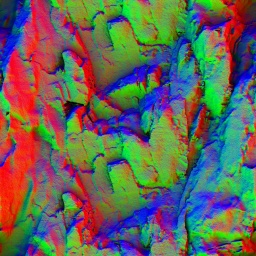$ssbump: Difference between revisions
Jump to navigation
Jump to search
 Tip:Self-shadowed normal mapping is actually faster than the standard method!
Tip:Self-shadowed normal mapping is actually faster than the standard method!
Craziestdan (talk | contribs) (paths have speach marks :P) |
TomEdwards (talk | contribs) (they don't have to...I don't know why we're using them in QCs.) |
||
| Line 11: | Line 11: | ||
LightmappedGeneric | LightmappedGeneric | ||
{ | { | ||
$basetexture | $basetexture nature/rockwall_cave02a | ||
$surfaceprop concrete | $surfaceprop concrete | ||
$bumpmap | $bumpmap nature/rockwall_cave_02a_height-ssbump | ||
'''$ssbump''' 1 | '''$ssbump''' 1 | ||
} | } | ||
Revision as of 04:05, 10 January 2009
$ssbump is a boolean material parameter that flags a $bumpmap as being self-shadowing. It is only supported with LightmappedGeneric and requires the Orange Box.
You can read more about the technology behind it in this paper.
Example
LightmappedGeneric
{
$basetexture nature/rockwall_cave02a
$surfaceprop concrete
$bumpmap nature/rockwall_cave_02a_height-ssbump
$ssbump 1
}
Creating self-shadowing bump maps
It's currently only possible to create ssbumps manually, since height2ssbump has yet to be released. Nevertheless, here are the command line parameters it will support:
- <path/filename>
- The source heightmap (TGA format).
- -r <int>
- Set the number of 'rays' (default 250). More rays take more time.
- -f <int>
- Set smoothing filter radius (default 10; 0 disables).
- -n
- Generate a conventional normal map.
- -A
- Generate ambient occlusion in the alpha channel.
- -D
- Write out filtered result as
filtered.tga.
